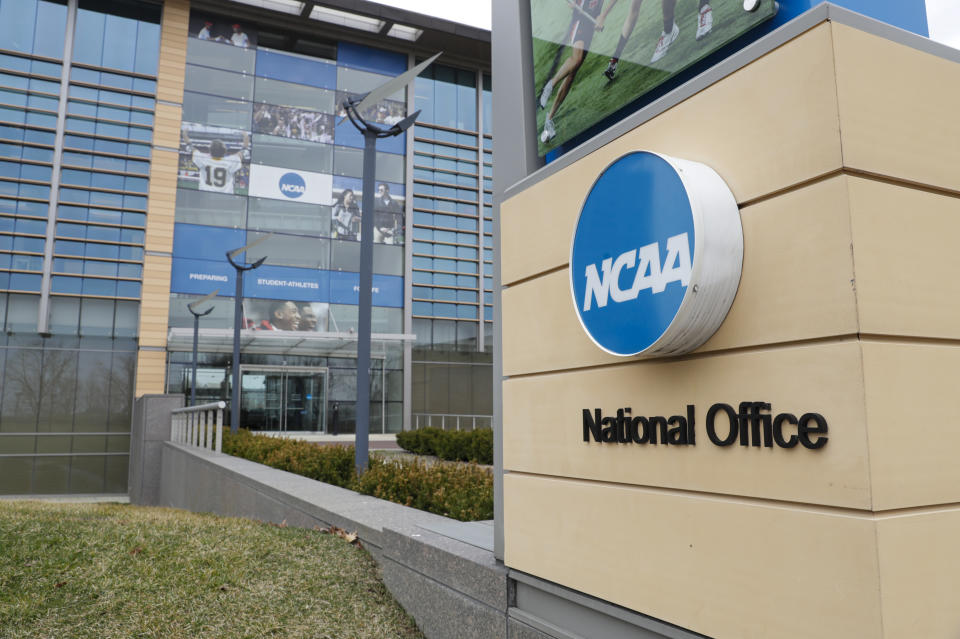Major change to NCAA transfer rules expected to be voted on in May
A vote on a potential major change to college sports is coming around the corner.
A proposed waiver that would allow all athletes to transfer once without being required to sit out for a season at their new school will be discussed when the NCAA Division I Council meets in April. From there, a vote will follow on May 20, MAC commissioner Jon Steinbrecher told Stadium.
Steinbrecher is the chair of the NCAA’s Division I Transfer Waiver Working Group, which came out in support of the proposal in February. The concept was initially pushed by the Big Ten and subsequently publicly backed by the ACC.
Presently, athletes in football, men’s basketball, women’s basketball, baseball and hockey are required to sit out for a season when they transfer to a new school. The main exception is with athletes who have graduated with remaining eligibility. Those “graduate transfers” are granted immediate eligibility at a new school.
Athletes in all other sports can participate immediately.

Rule change would have massive impact on college basketball
The proposal being considered in NCAA circles would allow first-time transfer athletes to compete immediately as long as they receive a transfer release from their previous school, leave their previous school academically eligible, maintain their academic progress at their new school and leave under no disciplinary suspension.
D1 Baseball is reporting that the proposal is expected to pass and go into effect immediately for the 2020-21 season. However, Steinbrecher told Stadium that it is unclear when the waiver, if it passes, would go into effect.
Should this rule change pass and go into effect prior to the 2020-21 season, it would have a massive impact on the next college basketball season.
According to ESPN, there are 746 Division I men’s basketball players in the transfer portal, 565 of which would have to sit out next season if the rule does not change. If it does change, those players would be allowed to suit up right away with additional players potentially deciding to follow that path and leave their school after the vote in May.
Athletes who have transferred previously or do not meet the proposed criteria would be subject to the waiver process.
Transfer waiver decisions wildly inconsistent
Transferring is prevalent among all college students, not just athletes. In recent years, the NCAA has loosened its position on transfers. A big step came when the “transfer portal” was instituted, allowing athletes to simply inform their school that they were leaving instead of asking for permission. Once the athlete’s name appears in the portal (which is a simple database), coaches from other universities were free to reach out.
There has also been an increase of NCAA waivers granted to athletes under various circumstances. The waiver rulings, which decide the fate of transfer athletes seeking immediate eligibility, were quite inconsistent in 2019 — especially in football.
While quarterbacks like Tate Martell and Justin Fields were allowed to play at their new schools, players who endured family hardships like Virginia Tech offensive lineman Brock Hoffman and Illinois tight end Luke Ford had their requests denied.
Steinbrecher said implementing the one-time transfer waiver would refocus the waiver process, which was designed to “handle extenuating and extraordinary circumstances.”
NCAA also to discuss name, image and likeness rules
Also on the budget for April’s DI Council meeting is legislation that would allow college athletes to profit from their names, images and likenesses.
NCAA vice president for Division I Kevin Lennon said this week that the group formed to tackle NIL ideas has reached a place where it can begin to share the proposed concepts throughout NCAA membership. Lennon described the recommendations as “robust.”
“There may be some who are actually a little bit surprised, candidly, at how far these recommendations are going and how robust they are,” Lennon said. “I think people will be very impressed by the thoughtful nature in terms of how we’re going to go about helping our young people.”
While changes to the transfer rules seem to be coming soon, a formal vote on NIL rules is not expected until January 2021.
More from Yahoo Sports:

